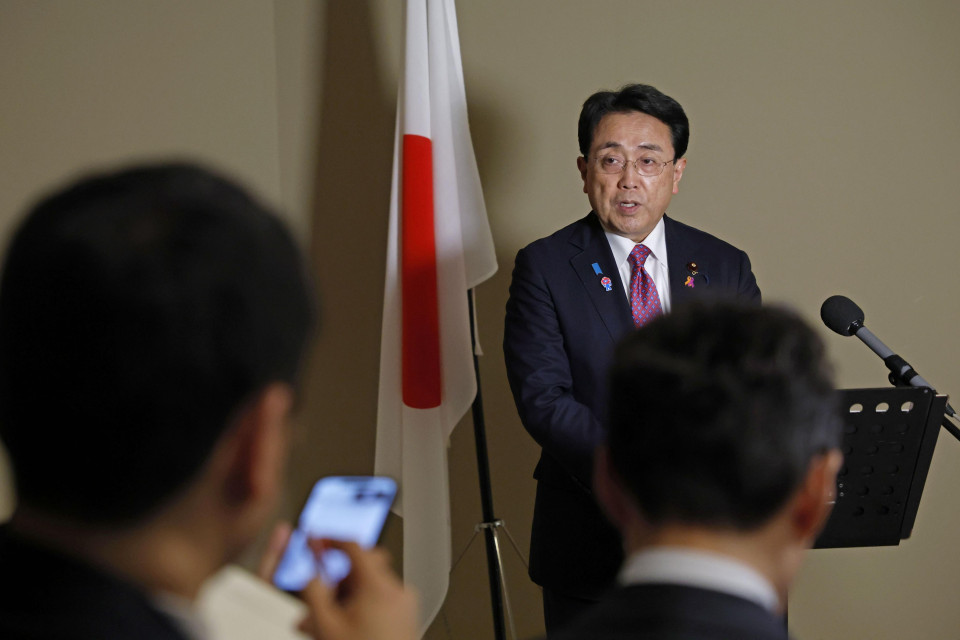Japan’s chief tariff negotiator on Friday made a last-ditch effort to smooth the way for a mutually beneficial trade deal at a planned in-person meeting next week between the leader of his country and U.S. President Donald Trump, but whether that goal can be achieved appeared to be still up in the air.
Following separate meetings with U.S Treasury Secretary Scott Bessent and Commerce Secretary Howard Lutnick in Washington, Ryosei Akazawa told reporters that he had “explored the possibility” of a trade deal with them during “extremely in-depth” discussions.
Akazawa, however, repeatedly declined to comment on whether it would be struck on the sidelines of an upcoming Group of Seven summit in Canada.

Japan’s chief tariff negotiator Ryosei Akazawa speaks to reporters in Washington on June 13, 2025. (Kyodo) ==Kyodo
“In negotiating matters, there are times when an agreement is reached in a sudden turn of events, and there are also times when the process drags on for an unexpectedly long period of time,” he said. “I would like to refrain from making any preconceived remarks.”
Akazawa, Japan’s minister for economic revitalization, who is visiting the U.S. capital for the fourth straight week, said both sides agreed to continue ongoing tariff negotiations.
Shortly before Akazawa’s arrival in the United States, Japanese Prime Minister Shigeru Ishiba spoke with Trump by phone, with the leaders agreeing to meet bilaterally on the margins of the two-day G7 summit beginning Monday in the Canadian Rocky Mountain resort of Kananaskis.
While voicing hope for progress in the ongoing Japan-U.S. negotiations, which kicked off in mid-April in the wake of Trump’s sweeping “reciprocal tariffs,” Ishiba told reporters that Tokyo’s demand that Washington scrap its higher tariffs on Japanese goods remains intact.
Ishiba also said he has told Trump that Japan will reduce its trade surplus with the United States.
Akazawa said Friday his meetings with Bessent and Lutnick lasted about 45 minutes and 70 minutes, respectively.
In his rounds of talks with Bessent, Lutnick and Trade Representative Jamieson Greer, Akazawa has not backed off from Japan’s position, demanding a full removal of all additional tariffs imposed by Trump, including those targeting the automotive sector.
This time round, Akazawa refused to say whether he made such a request, although he was asked multiple times.
Before leaving Tokyo, Akazawa told reporters that Japan expects to be given “special treatment” with regard to Trump’s higher auto tariffs and excluded from rules applied to other countries once it strikes a deal with his administration.
“Automobiles are the most important. If we don’t know what will happen there, we won’t agree,” a Japanese government official said, while adding, “We’re getting to the point where we might be able to reach an agreement.”
However, Trump said Thursday that he may increase his 25 percent tariff on foreign-made cars “in the not-too-distant future” in a bid to attract more investment in American manufacturing.
In addition to increasing the tariff rate for passenger cars to 27.5 percent from 2.5 percent, the Trump administration raised other sector-based and country-specific duties.
Under the reciprocal tariff regime, combined with a baseline rate of 10 percent covering nearly all goods imported by the United States, Japan faces an additional country-specific tariff of 14 percent, for a total rate of 24 percent.
To facilitate negotiations, Trump has implemented a 90-day pause for tariffs set above 10 percent for 60 trading partners.
Earlier this week, Bessent said the United States could extend the pause, set to expire in early July, if its major trading partners continue to negotiate “in good faith.”
Akazawa’s statement about “special treatment” is believed to have been made in light of a deal between Britain and the Trump administration in May, which allowed the country to export 100,000 cars per year into the U.S. market with only a 10 percent tariff, granting a partial exemption from the 27.5 percent rate.
But as Japan exports a far higher volume of cars to the United States, totaling about 1.37 million units in 2024, it remains to be seen whether a deal akin to the one struck between Britain and the Trump administration will be possible.
Related coverage:
Ishiba, Trump to meet on G7 fringes: Japan PM
Japan hopes for special treatment as Trump hints at auto tariff hike
Trump says U.S. Steel controlled by him with “golden share”

AloJapan.com